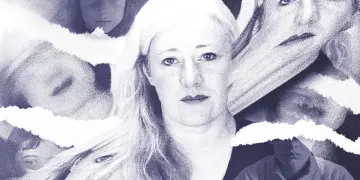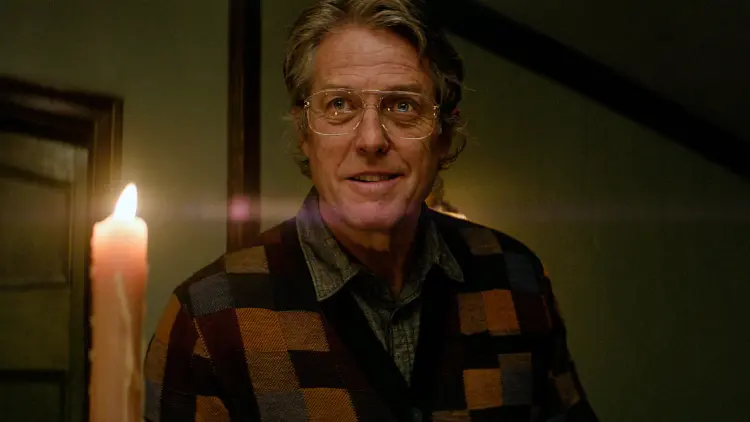Scott Beck and Bryan Woods’ Heretic is a tense and thought-provoking thriller that uses horror to explore the power, complexity, and fragility of belief. Anchored by standout performances, particularly from Hugh Grant in a career-defining role, the film masterfully balances unsettling tension with intellectual depth, delivering a story as terrifying as it is cerebral.
The film follows two young Mormon missionaries, Sister Barnes (Sophie Thatcher) and Sister Paxton (Chloe East), as they arrive at the home of Mr. Reed (Hugh Grant) to discuss their faith. What begins as a polite theological conversation spirals into an increasingly sinister psychological game, as Reed uses his charm and intellect to probe the very foundations of their beliefs. The movie builds its horror not through cheap scares but through its unnervingly intimate dialogue, punctuated by moments of visceral dread.

Grant is at the center of Heretic, delivering a deliciously dark performance that weaponizes his trademark affability. His Mr. Reed begins as an eccentric, seemingly harmless intellectual but slowly reveals his malevolent edge. The charm that once endeared audiences in rom-coms is turned on its head, becoming a tool for manipulation and cruelty. Lines like “What are your thoughts on polygamy?” and his sardonic musings on music icons like Lana Del Rey and Radiohead strike a delicate balance between humor and menace. Grant’s ability to oscillate between these extremes makes Mr. Reed one of the most memorable horror antagonists in recent years.
The young actresses hold their own alongside Grant. Thatcher’s Sister Barnes is a street-smart foil to East’s more naive and devout Sister Paxton, and both bring emotional depth to their roles. Thatcher, who has already proven her horror chops in The Boogeyman and Yellowjackets, conveys strength and vulnerability in equal measure, while East captures the quiet tragedy of someone whose faith blinds them to the dangers around them. Together, they embody the film’s central themes of belief, doubt, and survival.

Visually, Heretic is a triumph. Cinematographer Chung-hoon Chung (The Handmaiden, Oldboy) transforms Reed’s seemingly ordinary house into a claustrophobic labyrinth of shadows and threats. The camera prowls through dark hallways and lingers on characters’ faces, capturing every flicker of fear and deceit. This meticulous visual style amplifies the tension, immersing viewers in the increasingly perilous situation faced by the missionaries.
The film’s script, also by Beck and Woods, is packed with sharp dialogue and philosophical musings, making the first two-thirds of Heretic a riveting psychological chess match. However, the third act veers into more conventional horror territory, losing some of the broiling tension that makes the earlier sections so compelling. While the climax offers its fair share of shocks and revelations, it feels slightly at odds with the slow-burn intensity that precedes it.
Despite this minor stumble, Heretic remains a deeply effective horror film. It deftly uses its genre trappings to ask unsettling questions about faith, indoctrination, and the human need to believe in something greater than ourselves. The story never mocks its characters’ convictions, treating their struggles with empathy even as it challenges their worldviews.
Heretic is a standout entry in modern horror, showcasing the talents of its directors, cast, and crew. Hugh Grant’s masterful performance alone is worth the price of admission, but the film’s haunting exploration of belief ensures it will linger in the minds of audiences long after the credits roll.

TL;DR Review
Heretic (2024)
Heretic is a gripping psychological horror that shines with sharp dialogue, thought-provoking themes, and a standout performance by Hugh Grant. While the third act leans into conventional horror, it remains a haunting exploration of faith and belief, cementing its place as a standout in modern horror.
Review Breakdown
-
Unruly Rating




























































